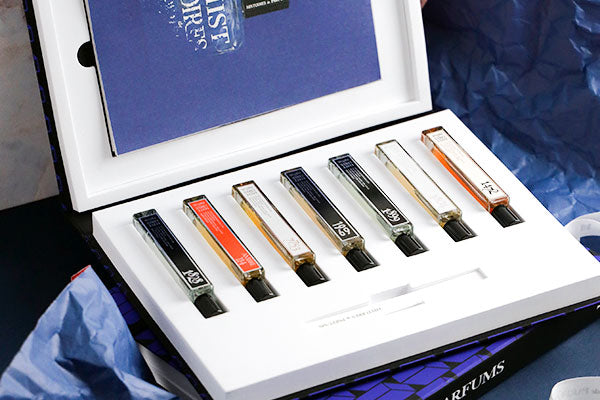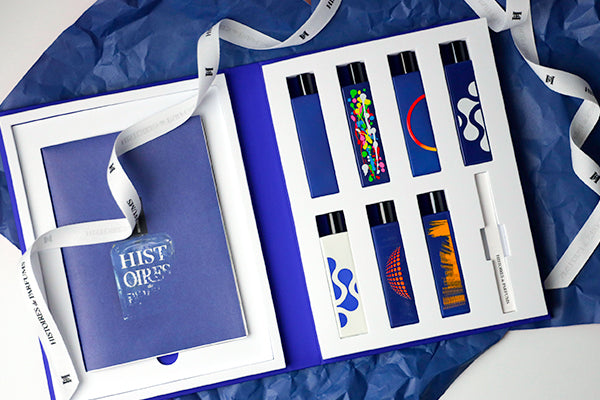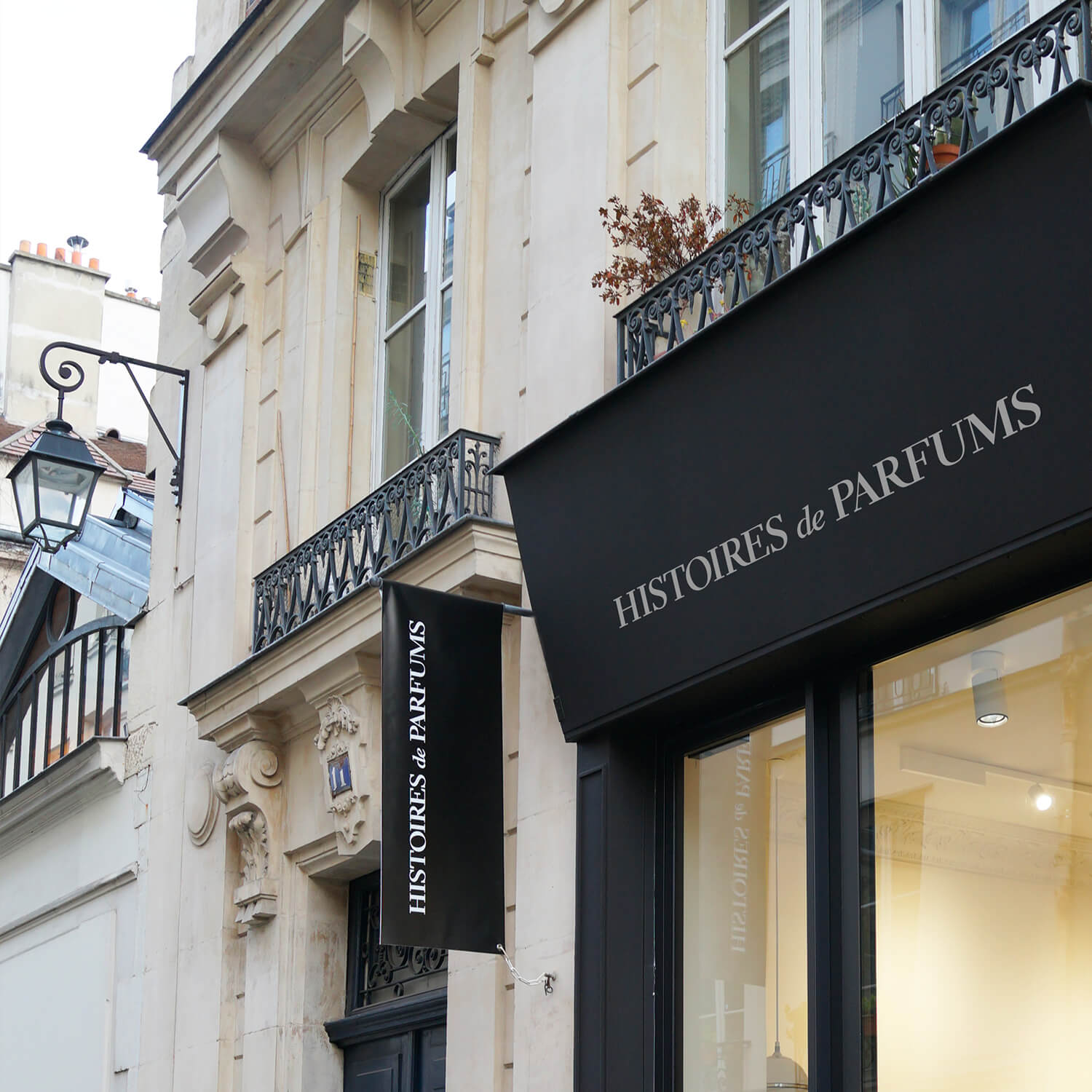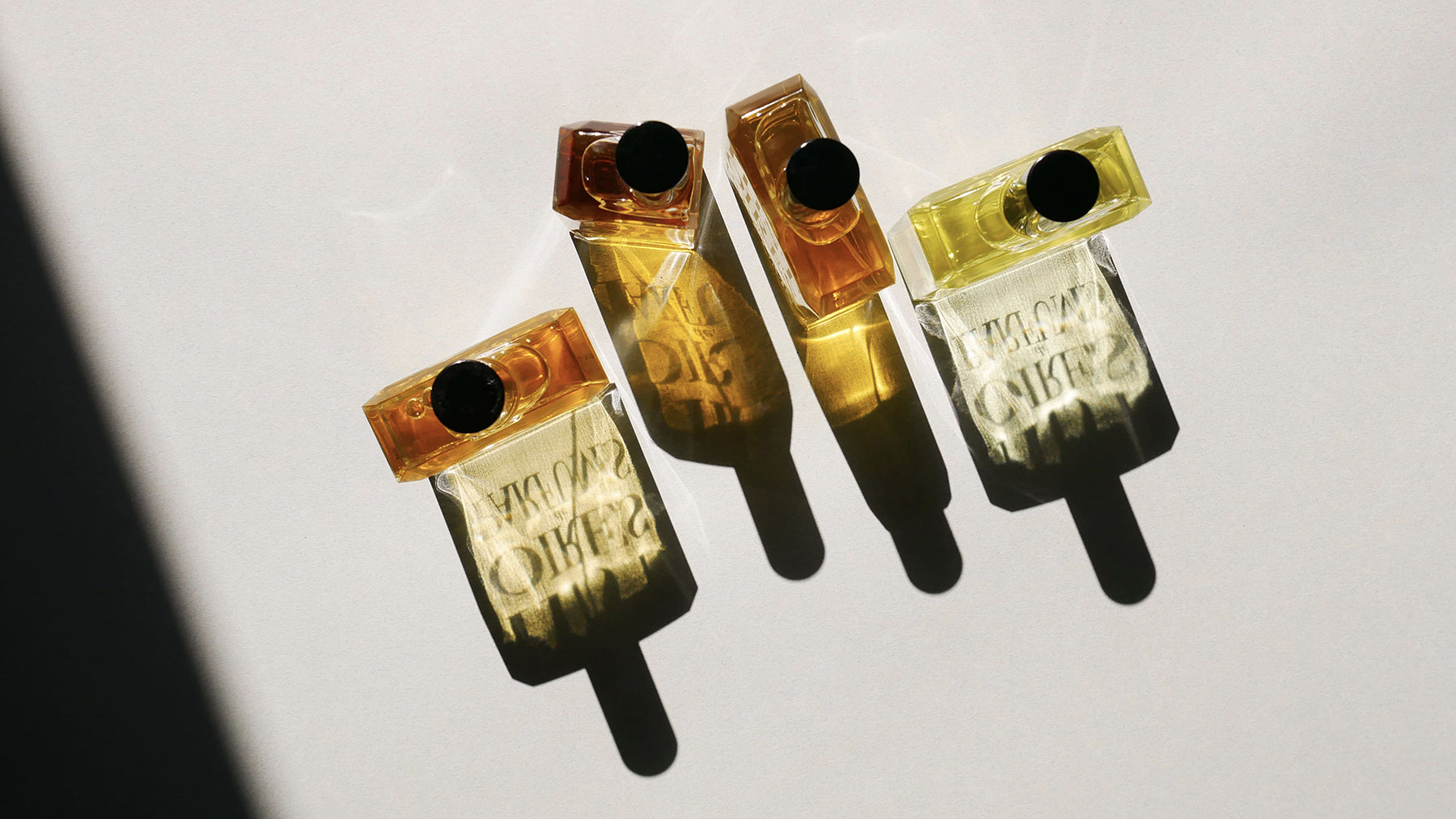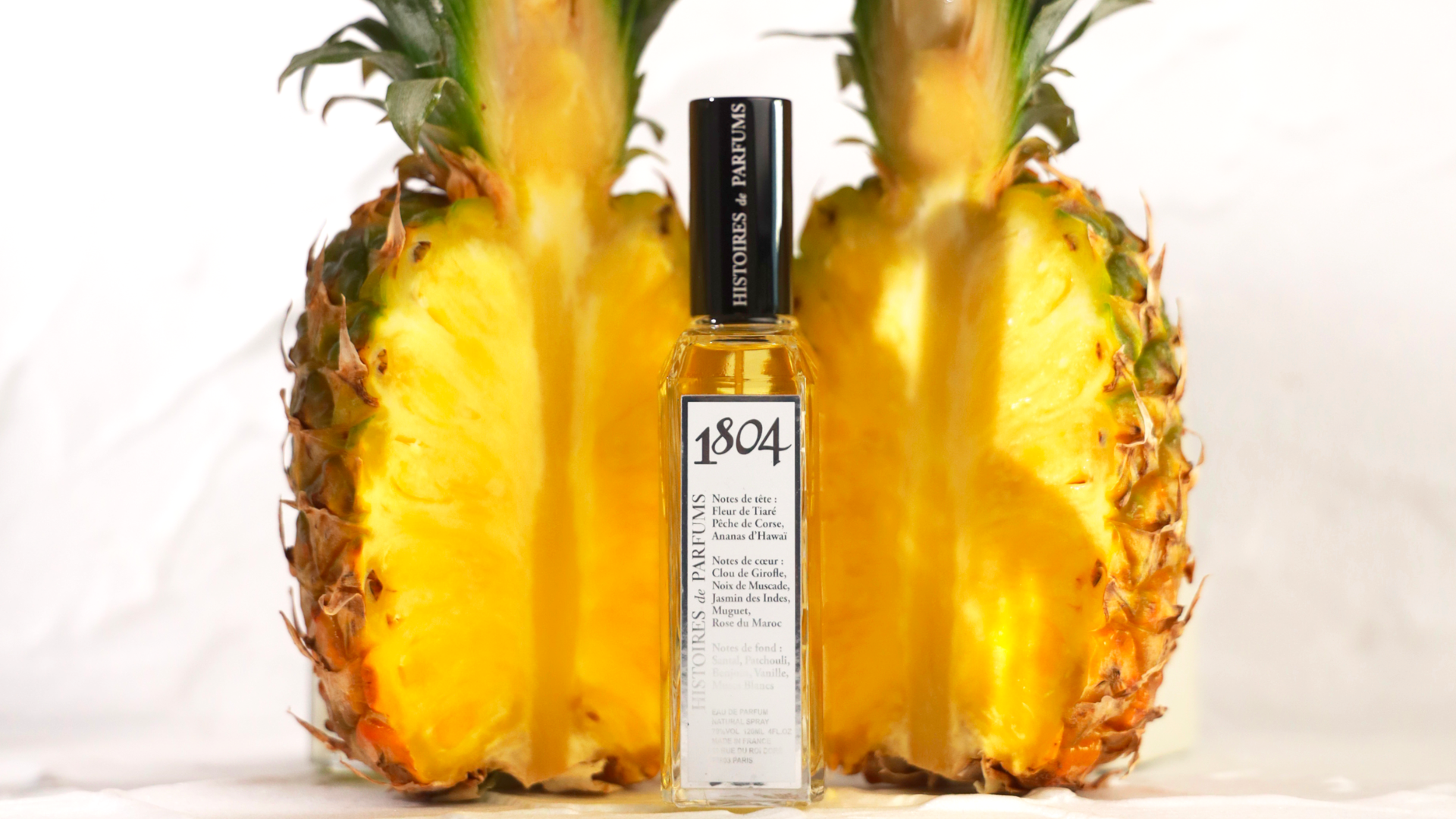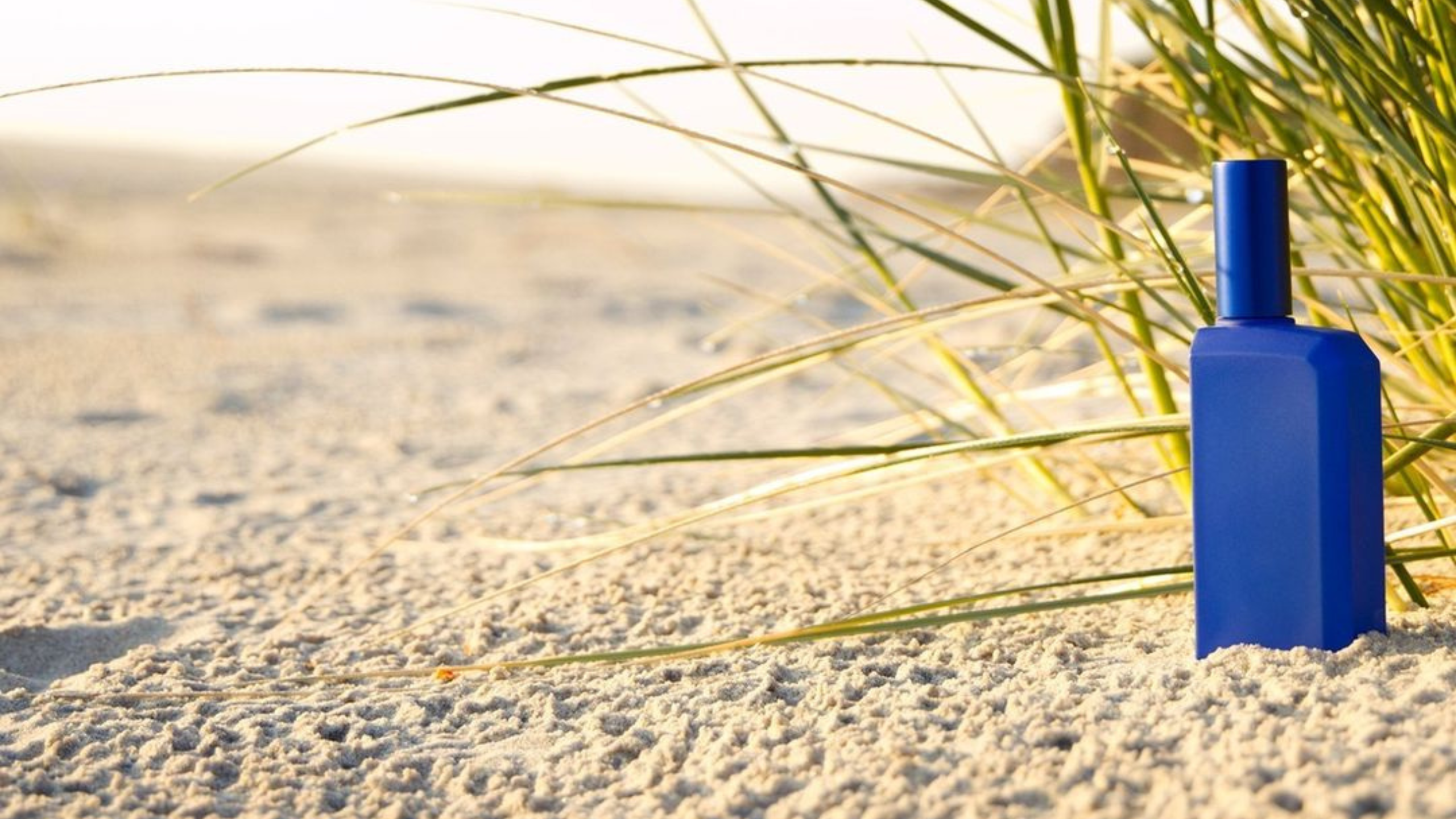
The Scents of Traveling
As you make your final preparations for the holidays, we're here to remind you not to forget to take your favorite fragrances with you. After all, our 'travel sizes' are called so for a reason.
And to motivate you in your selection, here's what our teams have come up with for the summer ahead.
1/.1 - For a trip to the sea.
If the blue beckons you as soon as the temperature rises, look no further. This is not a Blue Bottle 1/.1 is the friend you need. The mineral, aldehydic opening evokes both the twinkling of stars and the freshness of sea foam, while the honey-like heart overflows with a juicy Orange to prolong the sweetness of summer joy on your skin.

1/.2 - For a high-altitude getaway.
If the crowds on the beach frighten you and you prefer the silence of the mountain pastures, opt for This is not a Blue Bottle 1/.2. Chilled by a shiver of aldehydes and warmed by solar rays of Ylang-Ylang and Vanilla, its central bouquet of wildflowers, Cyclamen, Lilac and Lily of the Valley, will accompany you perfectly on your country walks and leave their lasting impression on your skin.

1/.6 - For a trip to Capri.
Or Tuscany. Or Amalfi. On any citrus-fringed riviera. The agrestic sparkle of Yuzu and Petitgrain, the enveloping sweetness of Orange Blossom, the sensual and delicate intertwining of Lotus and Jasmine – This is not a Blue Bottle 1/.6 is at once jet-setting and cheerful, rural and terribly urban. A zest of freshness to be applied on the skin as soon as it gets a little too hot... and without moderation.

The Scents of Traveling
Voyage.
The word comes from the Latin, viaticum, meaning "travel provisions", and what better provision than the spiritual one of perfume. Perfume, as we know it today, is the fruit of many journeys, of intertwined paths and lives. The incorporation of materials as diverse as benzoin, jasmine, myrrh and frankincense into a perfume composition is by no means natural. As the oldest perfume formulas prove, such as those found on the Pylos tablets in the 2nd millennium BC, the perfumers of yore simply extracted the fragrant substance from plants in their immediate environment. The Greeks produced Irinon, a perfume made from irises, Rhodinon, extracted from Phaselis roses, and even perfumes made from sage and aromatics.
Perfume tells a story of peoples who were explorers, curious, conquerors, or all, and who incorporated plants from their respective lands into their elixirs thus creating ever more elaborate fragrances. The collision of the Persians and the Greeks introduced the latter to the rich balsams imported from their orient: myrrh, benzoin, saffron and frankincense. It was for the latter, it is thought, that Rome decided to extend its empire eastwards, embarking on a journey to the Arabia Felix, the mythical land of Sheba, where originated the sacred resin of the frankincense tree. It was also in the Abbasid Baghdad that the Arabs, proud of their spicy, woody fragrances, were introduced to the art of Persian perfumes, which were much more floral; the same Persians who, subdued by the Timurids, passed on to them this art that had already merged previous cultures and generations. Finally, it was the amalgamation of the Timurids and the Indians in the new Mughal Empire that, in 1611, led to the invention of the first essential rose oil, which, under the aegis of the British Raj, crossed other borders to establish itself in Ottoman Asia and floodeed European markets at the dawn of the 19th century.
At the same time, on the Bourbon Island, a slave by the name of Edmond Albius invented the manual pollination of vanilla, making it less expensive to use and allowing the European bourgeoisie to taste its sweetness. Vanilla had been cultivated for almost a millennium by the Totonac people when the conquistadors took it across the Atlantic Ocean to colonise the palates and palaces of the European nobility, seducing Elizabeth I as much as Anne of Austria, even sparking a theological controversy over its use, which was deemed too aphrodisiac to fit in with the very Catholic mores of 16th-century Europe. In 1874, Wilhelm Haarmann synthesised vanillin, much to the delight of perfumers, who happily used it in their creations, giving rise to one of the most famous accords in perfumery: the amber accord.
And what about nutmeg and cloves, so highly prized that they motivated the Dutch to give up their island of Manhattan to the English in exchange for the island of Run (in present-day Indonesia), where they were grown; spices without which Femme, Chaldée, Shalimar and Tabac Blond would never have been created?
And what about Balkan juniper? What about Mysore sandalwood, transplanted to the desert plains of the Australian bush? What about bitter orange from ancient Asia, now cultivated from Egypt to Morocco? What about rosewood from the Amazon, tonka beans from Guyana and Venezuela, Jamaican Bay Saint Thomas, Aubrac narcissus and American tulip trees? What about gaiacwood from the West Indies, Indian jasmine, Chinese osmanthus or Vietnamese oud? What about Japanese yuzus, Australian boronias and the desert frankincense extracted by the Omanis, transported by the Bedouins, negotiated by the Nabataeans, bought by the Romans and later burnt by the Christians, without whom Encens Roi would never have existed?
More than a handy supply for countless journeys, perfume is rather their result. Each drop distils the story and the essence of going somewhere and coming back.
This month, while you're enjoying the freshness of the sea spray or the tranquillity of high dales, don't hesitate to slip one of our travel sizes into your luggage and, as you apply it to your wrist or the nape of your neck, close your eyes, inhale - and let yourself be transported far... far away.

This is not a blue bottle 1/.1
Our favorite journey? The one to the world of dreams. With This is not a Blue Bottle 1/.1, make yours the universal whole blue world. Mineral horizon, blazing stars of Orange and Honey, the dark, cosmic night of Patchouli... our fragrance of Abstraction is not acclaimed for nothing…


